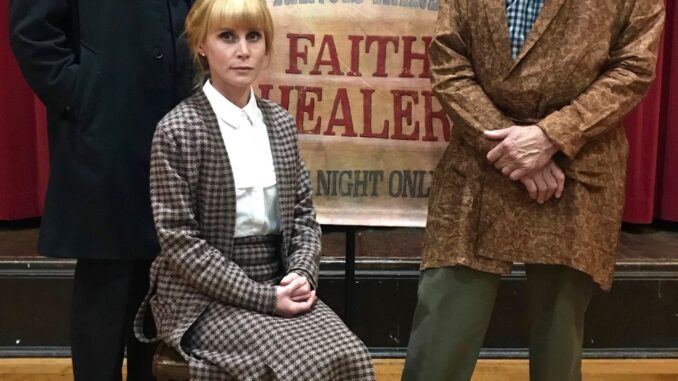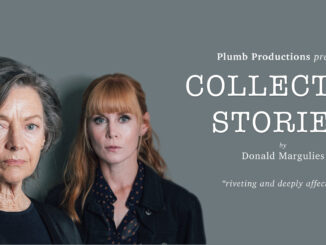
[Irish Blessing]
This production of Faith Healer, directed by Paul Gittins, marries a masterpiece of playwriting with the mastery of three accomplished actors.
I have read enough works from Irish playwrights to associate Irish drama with cloying hopelessness (looking at you Marina Carr in particular). I briefly hoped, though, that Faith Healer by Brian Friel would be an exception. I had neither read the play nor seen another production of Friel’s Faith Healer before attending this staging at the Pitt Street Theatre but my interest was piqued by the claim that the play possesses the “addictive pull of a detective yarn”.
The marketing for this production focuses strongly on the ‘enthralling’ and ‘mesmerising’ qualities of Friel’s text and while these descriptions are not undeserved, I caution potential audience members from jumping in head first if they are either unfamiliar with Irish drama or find abusive relationships and substance abuse triggering . The play is in essence two hours of skilfully woven misery. My companion likening the inevitable unravelling of the plot to “Irish Tarantino, it’s circular and everyone ends up dead”.
Now, having disabused the reader of any false hope, let me tell you why you absolutely should see this production. Friel’s play unfolds in a series of monologues. The delivery of each monologue invites the audience to piece together the events of the lives of three characters: Francis ‘Frank’ Hardy (Joseph Rye) a faith healer, Grace ‘Gracie’ Hardy (Michelle Blundell), and Teddy (David Aston) their irrepressible manager.
First we meet the charismatic but troubled Francis Hardy. Rye, as Hardy, draws the audience in, laying out the boundaries of the world and revealing just enough of his personal struggle to garner, if not empathy, some sympathy for his anguish. Then, some 30-40 minutes later, the story is passed to ‘Gracie’ and our grasp on the truth of the recounted events is completely shaken and the audience’s detective work begins.
Friel’s text is of the finest quality. The language of the script is at times poetic, searing, and chillingly memorable. Lines twist from one character to be found again in the mouth of another all contributing to a theatrical experience which leaves you feeling like a key witness to an unspeakable sadness. It is a text which demands much of both the cast and the audience and when performed with the skill and nuance demonstrated in this production well-deserves the accolades of being ‘addictive’, ‘enthralling’, and ‘mesmerising’. It is a testament to the director Paul Gittins’ guiding hand and the supreme control of the actors Rye, Blundell, and Aston that each monologue held the audience attentive to the point of captivation.
Rye’s Francis Hardy perfectly balances a boy-like longing for certainty and meaning with bitter adult fatalism while Blundell as Grace Hardy brings quiet strength in her resignation to the terrible events of her life. In contrast, Aston as Teddy delivers a wistfulness which, rather than diminishing the tragedy, adds a much needed lightness to the play.
The staging is clearly in keeping with the meagre stage directions included in Friel’s script; here some wooden chairs, there a tea pot and a bottle of whiskey, and after the intermission, Teddy’s record player. The absence of over-involved set pieces, backdrops, or extravagant props leave the largely barren floorboards of the Pitt Street Theatre, a satellite space of the Pitt Street Methodist Church, to speak for themselves. Between the wooden expanse of the stage space and my acceptable but not quite comfortable chair I was very conscious of the aptness of the venue for the production. At one point Teddy explicitly mentions a Methodist church and there is the sensation of the world of the play and the world of the performance overlapping in that uncanny way only theatre can evoke.
Built over the years 1865-66, the Pitt Street Methodist Church is a category two historic place and is imbued with all the musty darkness that churches of a certain age seem to possess. The atmosphere of the lonely village church halls which made up the fabric of the characters’ lives floods the theatre space. Even the lighting rig which supports Michael Goodwin’s precise and unpretentious lighting design is simple enough to barely register against the historical church context.
Despite the high quality of the performance and the cruel beauty of Friel’s text it’s easy to question the relevance of a play which initially presents as very ‘dated’ but simply put, the contextual and temporal distance of this Irish text are the very aspects of the play which allow an audience to reach past the reported action to the deeper themes. The revelation of these themes then evoking waves of parallels with current events and social issues. I found myself considering the isolation of communities which mistrust the Covid-19 vaccine and how these are the same communities which were preyed upon by manipulative artists like Hardy. There is also something to be said of having the opportunity to see so clearly that truth is not as subjective as our post-truth society would claim but rather truth is located somewhere between individual experiences. This notion is supported by the play’s structure which locates the audience as the holders of truth.
Almost anyone writing about theatre is going to refer to the mimetic nature of creative work, but often not enough is made of the value of a deliberately distorted mirror. Sometimes it is easier to look closely at the problems of domestic abuse, at themes of cruelty and shame, at our relationships with faith and hope when they are reflected back to us with the creative separation of taking place at a different time and in a distant geographical context.
This production of Faith Healer, challenging as it may be, offers something to every audience member: whether it is to be wrapped in a powerful story told by dexterous performers, or to glance into the looking glass and grapple with what is seen there.
Faith Healer plays Pitt Street Theatre 6-24th April, 2021.



Leave a Reply